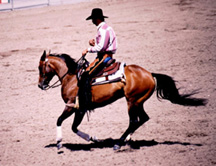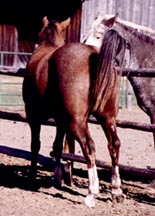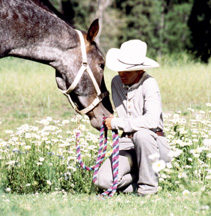 |
Mirror KB Articles
|
 |
Mirror KB Articles
|
Mirror KB Equine Article Series
Managing Those Temperamental Mares
Part
2
Article and Photos by Kim and Kari Baker
Managing Moodiness
You may feel that you have established a strong bond with your mare, but it is unlikely that it can surpass your mare’s natural need to preserve her species. In other words, when she is in heat her allegiance and devotion to you will slant in the direction of procreation, toward her own kind, pushing you down the line of priority.
Even though you understand your mare’s instinctive desire to associate with her own kind, it’s not necessary for you to totally give in to all of her quirks and moods. Some behaviors can be ignored while others, when applying a little horse sense, can be controlled or at least reduced. As an example, horses are unable to give active attention to more than one thing at a time. Perhaps you can take advantage of this characteristic by stimulating your mare with a new lesson, but keep it fairly simple. Remember she is experiencing an attention deficit so complicated lessons will only annoy her. On the other hand, if you typically ride in an arena, a fun trail ride could be the right answer for you as well as your distracted mare.
Look back at your daily log to determine what, if anything, you may be able to change to make life with your mare easier. For instance, if girthing up the saddle just seems to tick her off while she is in "that" particular stage of her cycle you might consider working her from the ground – longing or round pen work - during those days, or maybe simply choosing to ride her bareback. One thing you may want to consider is, mares that are kept in an easygoing backyard existence frequently show more problems during estrus than mares that spend much of their time in high-performance activities such as showing, racing and competitive trail rides.

Keeping your mare involved in high performance activities may curb her mood swings
Controlling Nature
Assuming that you and your veterinarian have successfully linked your mare’s heat cycle to her roller coaster mood swings, you can now decide on a method of treatments.
One choice is to breed your mare. This will likely improve her behavior problems if they are directly related to estrous. In order to sustain the pregnancy, an in foal mare’s progesterone will be at a high level and will normally keep her out of heat for the next 11 months or so. However, keeping your mare in the breeding barn isn’t necessarily the best answer, particularly if she doesn’t possess the physical qualities that you want reproduced.
In this case, spaying is another solution you may want to think about. Before taking this step you should first consider what your mare is like during her winter anestrous. At this time her ovaries will naturally pause from their monthly routine and her hormone low levels will naturally put her in a state much akin to that of a spayed mare. If your mare’s behavior is better during the inactive winter months then your mare is probably a good candidate for spaying.
Spaying requires the surgical removal of the ovaries in which your veterinarian has two options. One method is to remove the ovaries through the flank or the vaginal wall without the use of general anesthesia, while the mare remains standing on her feet. This method is by far the easiest on the mare. However, circumstance may require that the vet perform the ovariectomy through a midline incision that will necessitate anesthetising the mare in a recumbent position.
One thing to consider here is that in horses, all that is needed to produce estrous behavior is a low level of progesterone, so even a spayed mare can show signs of estrous. The addition of estrogen merely amplifies estrous. If your mare’s behavior is worse during the short period of sexual inactivity between heat cycles and much better during estrous, spaying could be very helpful, but if her problems are associated to estrus, spaying could actually make things worse.

Just as in spaying, before putting your mare on a progesterone treatment such as Regumate you must consider at what stage in your mare’s cycle she is at her worst and when she is at her best. Progesterone is the hormone related to pregnancy and thus if your mare is more content the week before ovulation than she is the week following, then progesterone therapy should be avoided. If however it is determined that progesterone therapy is right for your mare you must realize that not all mares respond the same way to the various products that are available and their dosage.
While mares have gained a reputation of being inconsistent and cantankerous, taking the time to understand your mare’s heat cycle and pinpointing the cause of her mood swings can reduce your frustrations and can even enhance your relationship with her.

If you'd like to read more interesting articles click on the following drop down link:
|
Mirror KB Photography & Gifts 1132 Arabian Lane Libby, MT 59923-7982 |
Phone: (406) 293-6586 |
Got questions? Contact us at: wranglers@mirrorkbranch.com
Trailhead | About
Us
| On the Trail | Raising an Orphan Filly
| Tales of the Twin Wranglers
Gallery 1 | Gallery
2 | Gallery 3 | Gallery
4 | Gallery 5
Montana T-shirts and more | Clothes an' more with Robert Fuller
Design
your own | Product
Information
Training Philosophy | Photography
| Promotional Photography
Gallery 6 | Gallery
7 | Gallery 8
| Gallery 9 | Gallery
10 | Gallery 11
Just Text Horse T-shirts | Just Text Mule T-shirts
Equine Articles | Twin
Wranglers | Ol' Bake
Equine
Hangman | Product
Order Form | Links
Our
Privacy Policy
Send an
E-greeting | order Greeting Cards